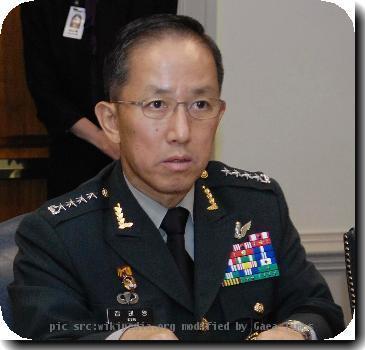SKorean minister calls for pre-emptive strike on North if nuclear attack looks imminent
By Kwang-tae Kim, APTuesday, January 19, 2010
SKorean minister: Hit North first if threatened
SEOUL, South Korea — South Korea’s defense chief called Wednesday for a pre-emptive strike on North Korea if there is a clear indication the country is preparing a nuclear attack.
The comments came as the two sides opened a second day of talks on further developing their joint industrial complex in the North, and were likely to draw an angry reaction from Pyongyang, which recently issued its own threat to break off dialogue with Seoul and attack.
South Korea should “immediately launch a strike” on the North if there is a clear intention of a pending nuclear attack, Defense Minister Kim Tae-young said at a seminar in Seoul.
Kim made similar remarks in 2008 when he was chairman of South Korea’s Joint Chiefs of Staff, prompting North Korea to threaten South Korea with destruction.
The North, which conducted underground nuclear tests in 2006 and 2009, claims its nuclear weapons are not for use against South Korea, but rather are a security guarantee against what it claims is U.S. hostility.
Despite the rhetoric from both sides, officials held follow-up discussions Wednesday on the industrial complex in the North’s border city of Kaesong, according to Seoul’s Unification Ministry. It did not provide further details.
The South Korean delegation was scheduled to return home later Wednesday, said Unification Ministry spokesman Chun Hae-sung.
On Tuesday, they met for nearly four hours to assess their joint tour of industrial parks in China and Vietnam undertaken in December.
Chun had described the talks as taking place “in a serious and practical atmosphere.”
Seoul stressed the need for a quick and easy system for border crossings and customs clearance for South Koreans who travel to and from the industrial park, Chun said, in an apparent call on the North to improve the system.
The North said their recent surveys in China and Vietnam offered an opportunity to get information necessary to revitalize the complex, Chun said.
Kaesong, which combines South Korean capital and technology with cheap North Korean labor, is the most prominent symbol of inter-Korean cooperation. About 110 South Korean factories employ some 42,000 North Korean workers.
The complex came under a cloud in late 2008, however, when North Korea tightened restrictions on border crossings amid growing tensions between the two countries.
This week’s talks came just days after Pyongyang threatened to launch a “sacred nationwide retaliatory battle” and vowed to cease all communication with the South following reports of a South Korean contingency plan to handle any unrest in the isolated North.
Meanwhile, South Korea’s top nuclear envoy Wi Sung-lac left for the U.S. on Wednesday for talks with Stephen Bosworth, the special U.S. envoy to North Korea, and other U.S. officials on the North’s nuclear programs, according to the Foreign Ministry.
The trip comes as North Korea has recently made repeated demands that international sanctions be lifted before it will return to stalled negotiations aimed at ending its nuclear weapons programs.
The North has also called for the signing of a peace treaty to formally end the Korean War, saying that the treaty would help end its hostile relations with the U.S. and promote the denuclearization of the Korean peninsula. Fighting in the 1950-53 conflict was stopped by a truce, not a treaty.
The U.S. rejected the North’s demand and urged Pyongyang to rejoin stalled international talks on ending the North’s nuclear programs.
“It would be inappropriate at this juncture to lift sanctions,” Assistant Secretary of State Kurt Campbell told reporters Tuesday in Washington. “We think that the appropriate next step is for North Korea to return to the six-party talks and to resume deliberations in this context.”
Last year, Pyongyang quit the six-party talks — with China, Japan, Russia, South Korea and the United States — in anger over international condemnation of a prohibited long-range rocket launch. The following month it carried out its second underground nuclear test.
Also Tuesday, the U.S. and Japan issued a joint statement reaffirming their cooperation with other nations to “deal with the threat from North Korea’s nuclear and missile programs as well as to address humanitarian issues,” according to the U.S. State Department. The statement was issued to mark the 50th anniversary of the signing of a U.S.-Japanese security pact.
Tags: Asia, China, East Asia, Greater China, North America, North Korea, Nuclear Weapons, Pyongyang, Seoul, South Korea, United States, Weapons Of Mass Destruction
